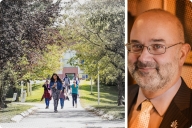You have /5 articles left.
Sign up for a free account or log in.
This summer, I boldly proclaimed that I was sick of trying to fit into whatever mould I thought would lead to success and acceptance in higher education. I’ve been forced to re-examine that post, in light of two fellow Bad Female Academics’ advice for job-seekers currently going through campus visit interviews. Karen Kelsky, from The Professor Is In, right here on IHE boldly wrote, “You have to jettison ‘Yourself.’” Tenure Radical more recently wrote that one needs to be like Austin Powers and treat those doing to the interviewing as fembots.
It’s pretty funny how Dr. Kelsky was soundly and almost universally derided for her advice while TR was greeted with quite moderate indifference. Both of these women, however, were offering the same piece of advice: be confident, be self-assured, and act like you belong. For many of us, that isn’t a large part of “being yourself.” It probably more appropriately fits under the umbrella of “fake it until you make it.”
My first job interview was to be a lifeguard. While the job was perfect, I showed up to the interview an improved (or perhaps more professional and responsible) version of myself. I wore a skirt (which almost never did). I shook hands, I sat up straight, and I somehow refrained from picking my fingers for a half an hour (a nervous habit I still have today). Sure, I was myself insofar as I spoke enthusiastically and knowledgeably about swimming, coaching, and lifeguarding. I was restrained, rather than an overwhelmingly verbose and over-exuberant 16-year-old girl who was desperate for her first lifeguarding job.
I never had to wear a skirt when I was lifeguarding (the uniform was literally a sweat suit) and my over-exuberance was a plus when it came to teaching very young children how to swim and not to be afraid. I quickly reverted back to slouching and nervous habits, but the good outweighed the bad and I did a good job. But, I needed to present the best version of myself to get the job in order to show how even those less “attractive” elements of my personality could be advantageous. I also learned pretty quickly that if I wanted to one day run the pool, I had some growing up to do.
We all have different facets to our personality. Very few of us can claim that we are exactly the same in every aspect of our lives. It’s all “me” but I act very differently with my students or my kids or my family or my best friends or my colleagues. Some versions of myself, I’m less proud of; there are people and circumstances that bring out my worst. There are also circumstances and times where we embrace that part of ourselves that we know is completely inappropriate in our day-to-day lives (I’m looking at you, New Orleans trip). I’m not the profanity-yelling super-hockey-fan when I teach and I’m not mom when I’m out having drinks with friends.
When I talk about being myself, I’m really saying that I’ve come to terms with all those part of myself, the good, the bad, and the ugly, and I’ve learned how to use them to my advantage. In a job interview, you need to be the best version of yourself. For me, being myself means that I am self-aware enough to know who I am and not feel threatened when someone suggests that there’s a time and a place for every one of the many parts of my personality.





